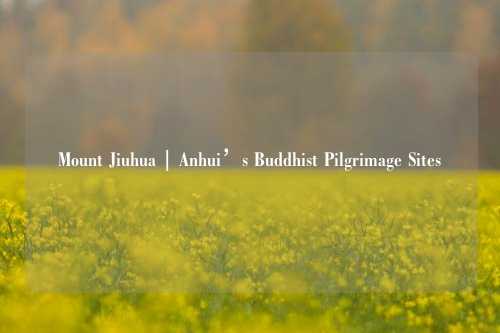Mount Jiuhua | Anhui’s Buddhist Pilgrimage Sites
Mount Jiuhua, or Jiuhua Mountain, rises majestically in the southern part of Anhui Province, China. Renowned as one of the Four Sacred Mountains of Buddhism in China, Mount Jiuhua holds a special place in the hearts of believers and travelers. This breathtaking mountain range is not only a haven for spiritual seekers but also a paradise for nature enthusiasts. Its lush forests, cascading waterfalls, and ancient monasteries create a serene atmosphere that invites visitors to introspection and renewal.
The significance of Mount Jiuhua dates back over a thousand years. It is the resting place of the Venerable Master Xuanzang, a revered Buddhist monk who traveled to India to bring back Buddhist teachings and scriptures. His ashes were enshrined at thetemple, which stands as a testament to his journey and the enduring influence of Buddhism in China. The mountain is also home to numerous temples and pagodas, each with its own rich history and spiritual energy. Pilgrims and tourists alike are drawn to Mount Jiuhua to pay homage to the teachings of the Buddha and to experience the heritage of the region.

One of the most iconic attractions on Mount Jiuhua is the Xuanzang Temple (Xuanzang Si), also known as the Master Xuanzang Memorial Temple. This temple is dedicated to the memory of the Venerable Master Xuanzang and houses his ashes in a stupa. Visitors can explore the temple’s architecture, adorned with carvings and vibrant Buddhist art. The temple’s serene gardens and peaceful meditation halls offer a perfect retreat for those seeking inner calm.
Another must-visit site on Mount Jiuhua is theQiyun Monastery (Qiyun Si). This ancient monastery is perched on a cliff overlooking the valley below, offering stunning views of the surrounding landscape. The monastery’s name, which translates to “Supporting the Clouds,” is a nod to its lofty position. Inside the monastery, visitors can admire the delicate balance between ancient Buddhist practices and the natural environment. The monks who reside here are known for their hospitality and insight, offering guidance to pilgrims seeking spiritual enlightenment.
For those looking to immerse themselves in the natural beauty of Mount Jiuhua, the mountain’s diverse ecosystems provide endless opportunities for exploration. The dense forests are home to a variety of flora and fauna, including ancient cedars and rare species of birds. The mountain’s trails wind through serene valleys, past crystal-clear streams, and up to breathtaking viewpoints. Hiking trails like the Heavenly Capital Peak (Tianzhu Feng) and the Lotus Flower Peak (Lianhua Feng) offer challenging ascents with rewarding panoramic views.
Mount Jiuhua is also a haven for photography enthusiasts, offering a ever-changing tapestry of landscapes throughout the year. In spring, the mountain comes alive with vibrant blossoms and嫩 green foliage. Summer brings lush greenery and cooling temperatures, making it an ideal escape from the heat. Autumn transforms the landscape into a mosaic of golden leaves, while winter blankets the mountain in a layer of snow, creating a serene and mystical atmosphere.
Beyond its natural beauty, Mount Jiuhua is deeply rooted in Buddhist culture. The mountain is home to the Five Great Temples (Wuli Si), which are among the most significant Buddhist sites in China. These temples are dedicated to the four great bodhisattvas— Avalokitesvara, Ksitigarbha, Manjusri, and Vajrapani—each representing different aspects of Buddhist teachings. Pilgrims visit these temples to pay their respects and seek blessings for health, wealth, and spiritual growth.
The Ksitigarbha Bodhisattva, known as the “Bodhisattva of Great Vows,” is particularly revered at Mount Jiuhua. The bodhisattva is believed to have vowed to help all beings attain enlightenment before becoming a Buddha. The shrine dedicated to Ksitigarbha at Mount Jiuhua is one of the most visited sites on the mountain, attracting countless pilgrims each year. Visitors can offer prayers, light incense, and reflect on the bodhisattva’s compassion and wisdom.
The mountain’s heritage is also reflected in its festivals and rituals. The most significant of these is the Xuanzang Festival, held in memory of the Venerable Master Xuanzang. During this festival, monks and laypeople alike gather to chant sutras, perform rituals, and pay homage to the master’s legacy. The festival is a time of reflection and celebration, drawing pilgrims from across China and around the world.
For those looking to learn more about the history and philosophy of Buddhism, Mount Jiuhua offers several opportunities for education and engagement. Many temples on the mountain host workshops, lectures, and meditation sessions, providing visitors with a deeper understanding of Buddhist teachings. These events are open to both pilgrims and curious travelers, making Mount Jiuhua a place of learning as well as spirituality.
Mount Jiuhua’s rich and natural heritage makes it a destination for travelers seeking both spiritual enrichment and adventure. Whether you are a devout Buddhist, a history buff, or a nature lover, the mountain offers experiences that will leave a lasting impression. Its serene landscapes, ancient temples, and teachings invite visitors to reflect on their journey and find inner peace.
, Mount Jiuhua is more than just a mountain—it is a gateway to a world of faith, culture, and natural beauty. Its spiritual energy, historical significance, and breathtaking landscapes make it a must-visit destination for anyone traveling to Anhui Province. So, if you are looking for a place to reconnect with your inner self and immerse yourself in the beauty of nature and culture, Mount Jiuhua is the perfect destination for you.
















